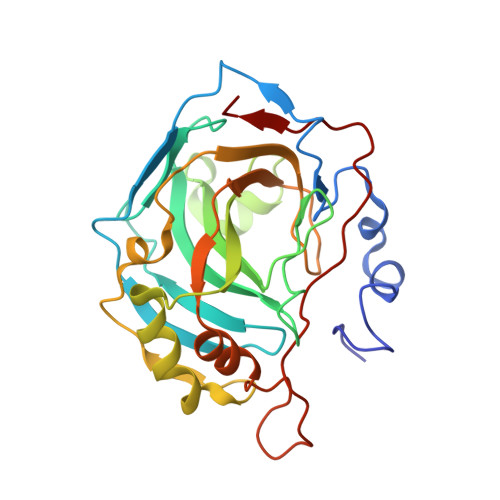Fluoroaromatic-fluoroaromatic interactions between inhibitors bound in the crystal lattice of human carbonic anhydrase II.
Kim, C.Y., Chandra, P.P., Jain, A., Christianson, D.W.(2001) J Am Chem Soc 123: 9620-9627
- PubMed: 11572683
- DOI: https://doi.org/10.1021/ja011034p
- Primary Citation of Related Structures:
1I9L, 1I9M, 1I9N, 1I9O, 1I9P, 1I9Q - PubMed Abstract:
Intermolecular interactions of eleven different fluoroaromatic inhibitors are probed within the scaffolding of the crystal lattice of Phe-131-->Val carbonic anhydrase II. The degree and pattern of fluorine substitution on the inhibitor benzyl ring modulate its size, shape, and electronic character. In turn, these properties affect the geometry of intermolecular interactions between the fluoroaromatic rings of two different inhibitor molecules bound in the crystal lattice, as determined by X-ray crystallography. Depending on the degree and pattern of fluorine substitution, we observe a face-to-face (aromatic-aromatic) interaction, an atom-to-face (carbonyl-aromatic) interaction, or no interaction at all. These interaction geometries are analyzed with regard to van der Waals, electrostatic, and possible charge-transfer effects. For the aromatic-aromatic interactions investigated in this study, with aromatic ring quadrupoles specifically "tuned" by the degree and pattern of fluorination, the structural results suggest that London forces and charge-transfer complexation dominate over weakly polar electrostatic interactions in the association of aromatic ring pairs.
- Roy and Diana Vagelos Laboratories, Department of Chemistry, University of Pennsylvania, Philadelphia, Pennsylvania 19104-6323, USA.
Organizational Affiliation:



















